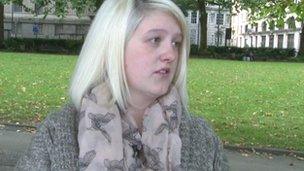Abortion: Justice Minister David Ford to consult on changing NI's laws
- Published

Thousands of women travel to other parts of the UK each year for a termination
Northern Ireland's justice minister has said he is going to consult on changing abortion laws to allow women carrying babies with fatal foetal abnormalities to have a termination.
Other grounds, such as abortion in rape or incest cases, are also expected to be covered.
David Ford said he hoped to put out a consultation document for the "potential for change" by next Easter.
He said he anticipated it would only apply to a narrow range of cases.
Fatal foetal abnormality is currently not a ground for abortion under Northern Ireland law.
Mr Ford told BBC Radio Ulster's Nolan Show he would review the legislation after two women told their stories earlier this year.
Both women discovered their babies had anencephaly, a severe brain abnormality, and would not survive outside the womb.
Sarah Ewart contacted the BBC's Nolan Show in October to highlight her experience.
She travelled to England for a termination after discovering her baby would not survive outside the womb.
Another woman, Laura, who was pregnant with twins, also got in touch with the programme to say she was facing the same situation.
'Difficult cases'
"What we have to do is carry out a consultation on the potential for change," said Mr Ford.
"Long before I became minister for justice, long before I met Sarah Ewart, I have said that there are clearly some very difficult cases in Northern Ireland which are not covered by the law as it applies in Northern Ireland.
"Now this is not talking about a wholesale introduction of the 1967 Abortion Act as applies across the water, it is simply saying that in a very narrow range of cases, I do believe we do need to consider whether it should be lawful to have an abortion in those circumstances where there is no chance of the foetus being delivered and having a viable life."

Sarah Ewart travelled to England for an abortion
Mr Ford said he had had discussions with a number of people in recent weeks, including representatives from the four major churches.
"I believe that there is certainly an understanding amongst many people that we do need to consider the issue and consider it seriously. We'll have to see as a result of the consultation what then is possible in terms of legislation for Northern Ireland, if that is the wish."
Personal stories
After her story aired on the Nolan Show, Mr Ford met one of the women.
"It's impossible to have a conversation with Sarah, her husband, and her mother, without being deeply impressed by what they went through, the turmoil for loving parents expecting a happy birth and then given that devastating news and clearly at that sense, obviously she had a personal effect on me," he said.
The laws covering abortion in Northern Ireland are the 1861 Offences against the Person Act, and the Criminal Justice Act 1945.
Terminations are only permitted to save a woman's life, or if there is a risk of permanent and serious damage to her mental or physical health.
Mr Ford said he would consider whether the law needed to be widened to include victims of rape or incest.
"It's clearly a slightly wider area than just the issue of fatal foetal abnormality," he said.
"I know there are some, including some who don't want to see a drastic widening of abortion legislation in Northern Ireland, who do believe we need to consider that as well."
Last year, official figures confirmed that at least 40 terminations a year are carried out on these grounds.
'Fundamentally opposed'
Justice Minister David Ford said there will be a public consultation on changing abortion law
More than 1,000 women a year who do not fit in these categories travel from Northern Ireland each year to have an abortion in other parts of the UK.
In England, Wales and Scotland access to abortion is covered by the 1967 Abortion Act. That permits terminations up to 24 weeks of pregnancy on grounds that include risk to the physical or mental health of the woman or existing children in the family, and abnormalities that could lead to a child being "seriously handicapped".
It is also allowed over 24 weeks if a woman's life or health is at serious risk, and for serious disabilities.
The DUP said the 1967 act allowed "the delivery of abortion on demand" and it was fundamentally opposed to it.
"We want to see as few abortions as possible take place in Northern Ireland," said a party spokesman.
He added: "We should always remember that behind the statistics and arguments lies the lives of fathers, mothers and unborn children. Everyone should approach this issue with sensitivity and compassion."
Sinn Féin said it was not in favour of the extension of the 1967 Act.
"We will participate in the consultation process, as it is important that there is as much consensus as possible across society built on this issue," a party spokesperson said.
"I'm sure all of the other parties, and wider society in general, will do likewise."
The SDLP also said it was opposed to the extension of the act and "felt immense sympathy and compassion" for any woman who experienced fatal foetal abnormality.
Ulster Unionist leader Mike Nesbitt said he personally would back change although "it was a matter of conscience for his party generally".
- Published10 October 2013
- Published9 October 2013
- Published9 October 2013
- Published8 March 2013
- Published27 February 2013
- Published27 February 2013
- Published19 February 2013
- Published4 February 2013